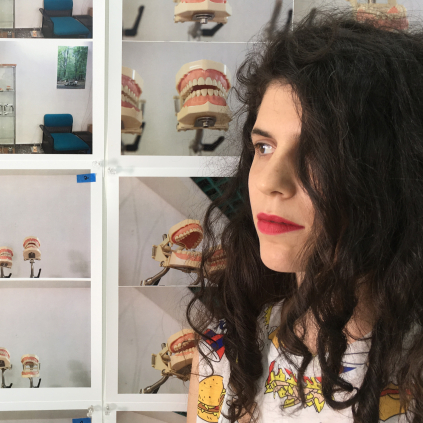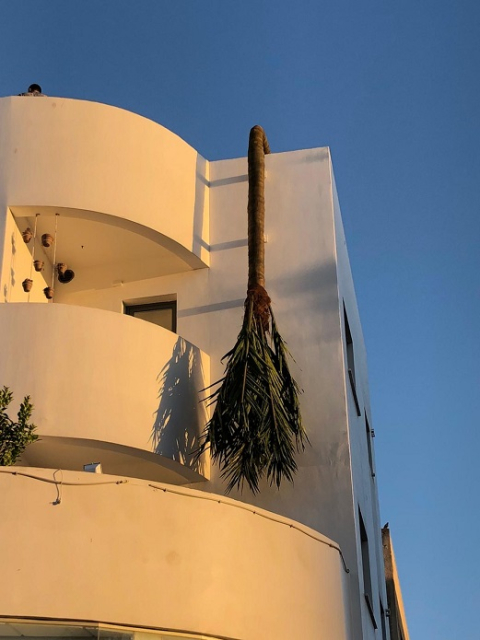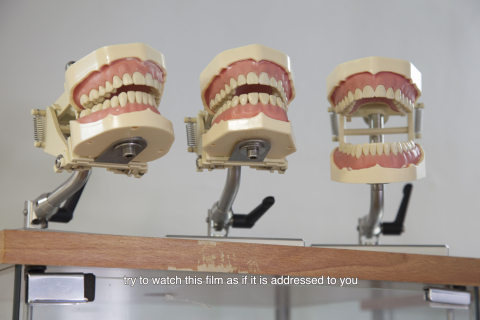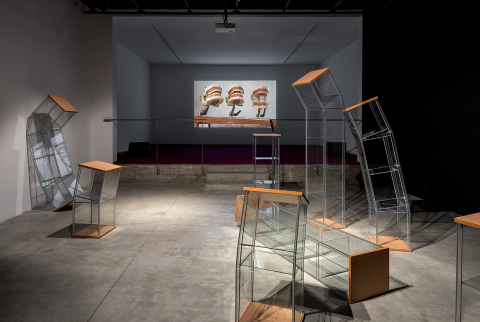Yael Frank

Works

In A Nutshell
Ready-madeA palm tree is the perfect, nearly hackneyed fantasy—from a coconut on a desert island to a poster in a teenage girl’s room, from artificial palm-shaped islands in Dubai to palms planted on traffic islands throughout Israel, extending across the Tel Aviv promenade, providing an imaginary, tropical touch to the Mediterranean shores. A tree with little shade, whose lifespan is around eighty years, like a human life, it stands upright until it no longer can, or until the palm weevil, a mysterious aphid, eats it from within, leaving our public space battered and strewn with the corpses of trees. A tree stands outside the window of Yael Frank’s grandfather, an engineer by profession, who was never able to explain to his granddaughter how the thin trunk holds the entire weight at its crown. The circumstances of life made it stand, and those same circumstances also made it fall. The artificial palm repeatedly falling from the Artport roof continues Frank’s engagement with esoteric readymades, focusing on the absurdity of what we take for granted, and delving deeper into the symbolism of...
Read more
A Problem
2018, Still from videoFrom the exhibition “A Problem” at Tel Aviv Artists’ Studios Gallery. Curator: Sally Haftel Naveh
Video installation, sound, manipulated Ikea Detolf cabinets, architectural intervention
At the core of the installation, a speech by three jaw oracles describes the politics and poetics of “the problem”. Influenced by the theatre of Bertolt Brecht, Samuel Beckett, and The Muppet Show, their speech moves between depictions of a banal catastrophe to descriptions of tacky emotions. This video is viewed through The Last Hour of Cabinet I – a funeral scene of sad Ikea Detolf cabinets. Upon entering the gallery, a delicate architectural and sound intervention turns a hallway into a surreal viewing area surrounded with elevator music, where ghosts are stuck in an endless waiting-room loop...
Read more
A Problem
From the exhibition ‘A Problem’, Tel-Aviv Artists’ Studios
Read more
In A Nutshell
Ready-madeA palm tree is the perfect, nearly hackneyed fantasy—from a coconut on a desert island to a poster in a teenage girl’s room, from artificial palm-shaped islands in Dubai to palms planted on traffic islands throughout Israel, extending across the Tel Aviv promenade, providing an imaginary, tropical touch to the Mediterranean shores. A tree with little shade, whose lifespan is around eighty years, like a human life, it stands upright until it no longer can, or until the palm weevil, a mysterious aphid, eats it from within, leaving our public space battered and strewn with the corpses of trees. A tree stands outside the window of Yael Frank’s grandfather, an engineer by profession, who was never able to explain to his granddaughter how the thin trunk holds the entire weight at its crown. The circumstances of life made it stand, and those same circumstances also made it fall. The artificial palm repeatedly falling from the Artport roof continues Frank’s engagement with esoteric readymades, focusing on the absurdity of what we take for granted, and delving deeper into the symbolism of...
Read more
A Problem
2018, Still from videoFrom the exhibition “A Problem” at Tel Aviv Artists’ Studios Gallery. Curator: Sally Haftel Naveh
Video installation, sound, manipulated Ikea Detolf cabinets, architectural intervention
At the core of the installation, a speech by three jaw oracles describes the politics and poetics of “the problem”. Influenced by the theatre of Bertolt Brecht, Samuel Beckett, and The Muppet Show, their speech moves between depictions of a banal catastrophe to descriptions of tacky emotions. This video is viewed through The Last Hour of Cabinet I – a funeral scene of sad Ikea Detolf cabinets. Upon entering the gallery, a delicate architectural and sound intervention turns a hallway into a surreal viewing area surrounded with elevator music, where ghosts are stuck in an endless waiting-room loop...
Read more
A Problem
From the exhibition ‘A Problem’, Tel-Aviv Artists’ Studios
Read more
In A Nutshell
Ready-madeA palm tree is the perfect, nearly hackneyed fantasy—from a coconut on a desert island to a poster in a teenage girl’s room, from artificial palm-shaped islands in Dubai to palms planted on traffic islands throughout Israel, extending across the Tel Aviv promenade, providing an imaginary, tropical touch to the Mediterranean shores. A tree with little shade, whose lifespan is around eighty years, like a human life, it stands upright until it no longer can, or until the palm weevil, a mysterious aphid, eats it from within, leaving our public space battered and strewn with the corpses of trees. A tree stands outside the window of Yael Frank’s grandfather, an engineer by profession, who was never able to explain to his granddaughter how the thin trunk holds the entire weight at its crown. The circumstances of life made it stand, and those same circumstances also made it fall. The artificial palm repeatedly falling from the Artport roof continues Frank’s engagement with esoteric readymades, focusing on the absurdity of what we take for granted, and delving deeper into the symbolism of...
Read more